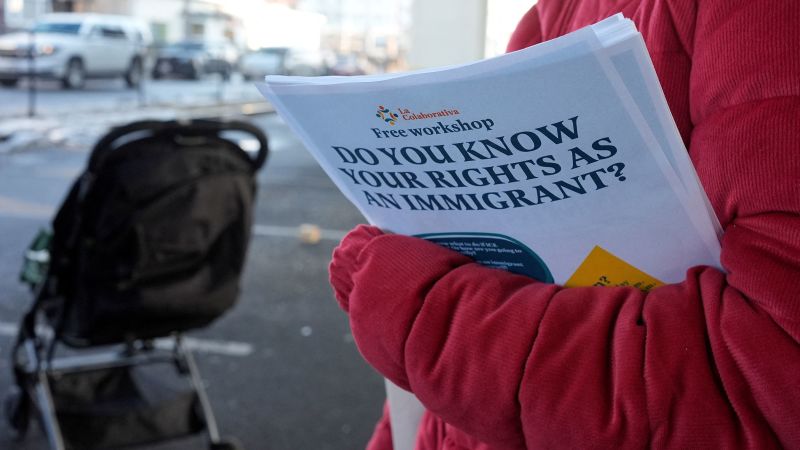
In a 2014 joint interview , former Supreme Court justices Ruth Bader Ginsburg and Antonin Scalia were asked a pressing legal question about immigrant rights. Do the five freedoms mentioned in the First Amendment – freedom of religion, speech, press, assembly and petition – apply to undocumented immigrants? “Oh I think so, I think anybody who’s present in the United States has protections under the United States Constitution,” said Scalia, the reliable conservative voice. Ginsburg, the stalwart liberal, agreed.
“When we get to the 14th Amendment , it doesn’t speak of ‘citizens.’ Some constitutions grant rights to ‘citizens,’ but our constitution says ‘person,’” she said. “And the ‘person’ is every person who is here – documented or undocumented.

” Over a decade later, that bipartisan view faces a stiff test in the legal battles over the Trump administration’s mass deportation efforts. The deportations have targeted undocumented immigrants from Venezuela for alleged gang affiliations based on limited evidence as well as students whose visas or green cards have been canceled in connection to pro-Palestinian protests. These migrants have been rounded up on the street by masked Immigration and Customs Enforcement agents and tossed into a labyrinthine detention system, far from their attorneys and families.
CNN spoke with several experts in immigration law to better understand what rights immigrants do and don’t have and what legal recourse migrants at risk of deportation have. Do foreign nationals have the same civil rights as US citizens? As Scalia and Ginsburg noted, immigrants do have the fundamental civil rights enshrined in the Constitution, including due process rights. “A permanent resident and a non-permanent resident, somebody on let’s say an H-1B visa or some other type of temporary visa .
.. has due process rights,” David Leopold, the former president and general counsel of the American Immigration Lawyers Association, said at a press briefing with immigrant rights advocates in mid-March.
“Everybody is covered by the United States Constitution. Everybody’s protected by the United States Constitution inside the United States.” However, immigrants’ presence in the US is generally considered to be a “privilege” rather than a right and can be revoked for certain reasons laid out in federal law, such as a serious crime.
“There is this idea in US immigration law that dates to the very early Supreme Court decisions that treats immigration as a privilege,” explained Nayna Gupta, policy director of the American Immigration Council, a pro-immigration non-profit group. “In other words, if you’re a non-citizen, you are being given the privilege of being here in the United States, and since you have the privilege of being here, we’re not obligated to extend the full range of constitutional rights and protections we might extend to a citizen.” Despite these protections on paper, permanent residents and visa-holders have been frightened by the speed and ferocity of the Trump administration’s crackdown and its bulldozing of due process rights , said Neil A.
Weinrib, an immigration attorney for more than four decades. “The level of terror that I’m seeing is just incredible,” Weinrib said of his clients. “I’ve never seen anything like this before.
It’s a new level. It’s unprecedented and changes every day, and not for the better.” Is immigration status a privilege or a right? Trump administration officials have repeatedly argued in court and in public statements that immigration is a privilege, and said the federal government has the power to choose which non-citizens can stay and which must leave.
“A visa is a privilege not a right,” a spokesperson for the Department of Homeland Security said in defending the removal of Rasha Alawieh, a Brown University assistant professor and doctor . “A green card holder, even if I may like that green card holder, doesn’t have an indefinite right to be in the United States of America, right?” Vice President JD Vance said in a recent interview with Fox News . “If the Secretary of State and the President decide, ‘This person shouldn’t be in America, and they have no legal right to stay here,’ it’s as simple as that.
” This view is most evident in the Trump administration’s move to revoke visas and green cards from the non-citizens who engaged in pro-Palestinian protests on college campuses over the last year and a half. The administration has been relying on an obscure section of US law which gives Secretary of State Marco Rubio authority to revoke a person’s immigration status if their “presence or activities in the United States would have potentially serious adverse foreign policy consequences.” Rubio said the government may have revoked more than 300 visas for the “lunatics” who were “creating a ruckus” during campus protests.
“Every country in the world has a right to decide who comes in as a visitor and who doesn’t,” he said. The idea that a visa or green card is a privilege is generally true, but that does not mean that a migrant’s legal status is solely based on the whims of those in power, immigration law experts said. It’s not altogether unusual for the government to revoke a migrant’s green card for legally prescribed reasons, Leopold said at the press briefing last month.
“I think a lot of people were stunned that somebody with a green card, a lawful permanent resident, could be subjected to arrest and possibly deportation, but that happens all the time,” he said. “So, a green card holder at the end of the day – and the Supreme Court has made clear since back in the Cold War era – they’re guests, legally speaking, in the United States.” Even so, in previous administrations, deportation efforts were based on serious criminal conduct like felony charges.
The Trump administration has focused on deporting people for petty offenses or even political positions, Weinrib explained. “We’re on the verge of a much more aggressive governmental intrusion in terms of exercising free speech for green card holders,” he said. “It’s a whole new era in enforcement that we’ve never seen before.
” Further, migrants detained in the immigration system still have due process rights to challenge their detention and the evidence against them. “We’re deeply concerned that the Trump administration here is abusing the vague and overbroad provision of US immigration law,” Naureen Shah, deputy director of government affairs for the ACLU, said at the press briefing last month. “What’s clear to us is that non-citizens are entitled to due process, especially for something as serious as revoking a green card.
” How are immigration courts different than criminal courts? The other key difference in rights afforded to citizens and non-citizens is in the court venue. While criminal courts are part of the judicial branch, immigration courts are administrative civil venues under the umbrella of the executive branch’s Department of Justice. Defendants accused of an immigration violation do not have the same rights as defendants accused of a crime.
That means immigration court defendants are not granted the right to an appointed attorney; the courts do not follow the federal rules of evidence around hearsay; and there is no right to cross-examine accusers, according to Gupta. A 2016 study by the American Immigration Council looking at deportation cases from 2007 to 2012 found only 37% of immigrants secured legal representation, including just 14% of detained immigrants. “In a criminal setting, everybody in that setting gets those set of rights,” Gupta said.
“But in the immigration civil system context, those rights are significantly less.” Even for defendants with attorneys, the government can make their accessibility difficult. For example, the Trump administration moved Mahmoud Khalil, the former Columbia University grad student and pro-Palestinian activist, from New York to a facility in Louisiana , making it harder for him and his attorneys to be in contact.
Similarly, Weinrib said one of his clients, a man from Tajikistan applying for asylum, was apprehended at a standard check-in in New York and moved to central Pennsylvania. “Part of the problem is they can be picked up and moved around like chess pieces, and that goes back many years,” Weinrib said. “They’ve always done that deliberately.
” On its website, ICE states that detention is “non-punitive.” “Once an alien is transferred to ICE custody, the agency makes a custody determination,” the agency says. “ICE uses its limited detention resources to detain aliens to secure their presence for immigration proceedings or removal from the United States.
” There is also no limit to how long people can be held in detention, Weinrib said. “It’s like a purgatory. Once you’re in the system, your rights are really quite limited.
” In sum, the question of what rights immigrants do and don’t have is one that has changed just in the last few months and is likely to continue doing so. “Every day we’re hit with a different decision, and we just don’t know how to make sense of it,” Veronica Cardenas, the former assistant chief counsel for the Department of Homeland Security, told CNN in mid-March. “Us immigration lawyers are really experiencing the lack of due process circumventing immigration courts, and so it’s been a very difficult time.
” CNN’s Priscilla Alvarez, Catherine Shoichet, Jennifer Hansler and Maria Prieto Aguilar contributed to this report..















